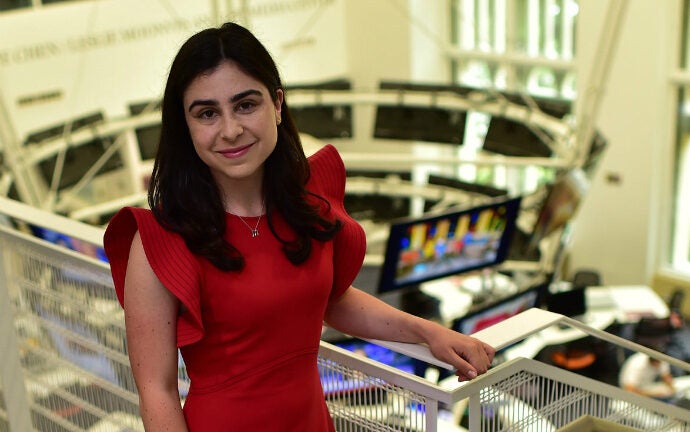
USC delegation visits Armenia’s capital to discuss post-Soviet outlook
One week after my graduation from USC, I landed in Armenia’s capital city, Yerevan, to begin my career as a journalist.
I stepped off the plane at Zvartnots International Airport, about seven miles outside of Yerevan, surrounded by chatter in a language I had learned as a child but used only at family gatherings. The moment marked the beginning of my postgraduate journey as an international reporter for the Yerevan-based online news platform, CivilNet.
Although I had moved thousands of miles away from USC’s University Park campus in Los Angeles, I immediately connected with my Trojan Family in Yerevan: Director of USC Dornsife’s Institute of Armenian Studies Salpi Ghazarian and institute associate directors Syuzanna Petrosyan and Silva Sevlian.
Examining Armenia’s future
One of the institute’s greatest strengths is its belief that the challenges and opportunities present in Armenia should be examined within a broader international context. In May, it hosted “End of Transition: Armenia 25 Years On, Now What?,” an academic conference about post-independence transitions in the former Soviet Union with a particular focus on Armenia.
Distinguished diplomats, philanthropists and scholars from around the world gathered in Yerevan’s Cafesjian Center for the Arts for two days of stimulating discussions. Among those attending were Ghazarian, Petrosyan and Sevlian; USC Provost Michael Quick; USC Vice President for Strategic and Global Initiatives Anthony Bailey; and Robert English, associate professor of international relations, Slavic languages and literature, and environmental studies. Topics included Armenia’s evolving relations with Russia, the changing role of churches in the world’s first Christian state and access to health care and environmental rights.
“I think the conversations about how nations evolve and what that means…is one of those interesting, hard problems for any nation in the 21st century,” Quick said at the conference.
Afterward, he noted the significance of the proceedings and the Institute of Armenian Studies. “It’s been a dynamic and changing time in Armenia,” he said. “I am pleased that we had an opportunity to hear from experts and to learn first-hand about the future there. It was an exciting visit and an important one for USC, as we seek to expand and support the work of our USC Institute of Armenian Studies.”
The conference was an ideal start to my summer: an opportunity to meet leading scholars in Armenian studies and to learn more about the topics I will cover throughout the next three months.
Awakening humanity
Just as the institute’s conference ended, another unique event began, and I had a chance to cover it. The Aurora Prize for Awakening Humanity, granted by the Aurora Humanitarian Initiative, is a global award that is given to an individual who risks his or her own safety to help others. The award includes $100,000 to the laureate, but perhaps more important, the laureate receives $1 million to share with organizations that do outstanding humanitarian work. The Aurora Prize is one aspect of a broader initiative, established on behalf of the survivors of the Armenian Genocide and in gratitude to their saviors.
The Institute of Armenian Studies partnered with the Aurora Humanitarian Initiative in another program: the 2017 Aurora Dialogues, which focused on the global challenge of migration. The Institute of Armenian Studies, together with USC Dornsife’s Center for the Study of Immigrant Integration (CSII), convened a panel of international experts on the topic. CSII’s director, Manuel Pastor, Turpanjian Chair in Civil Society and Social Change and professor of sociology and American studies and ethnicity, moderated the discussion.
I interviewed guests for CivilNet’s broadcast of the Aurora Dialogues, and provided live coverage from the prize ceremony in Yerevan. In the span of three days, I spoke to Nobel laureates, Asian and African humanitarians, American and European risk-takers — those who are committed to humanitarian work, around the world, even at great risk to themselves — and realized how small the world is. I am alive because my great grandparents survived thanks to the humanity and generosity of such risk-takers.
Video of Day 1 and Day 2 of the conference is available on the USC Dornsife Institute of Armenian Studies YouTube channel.